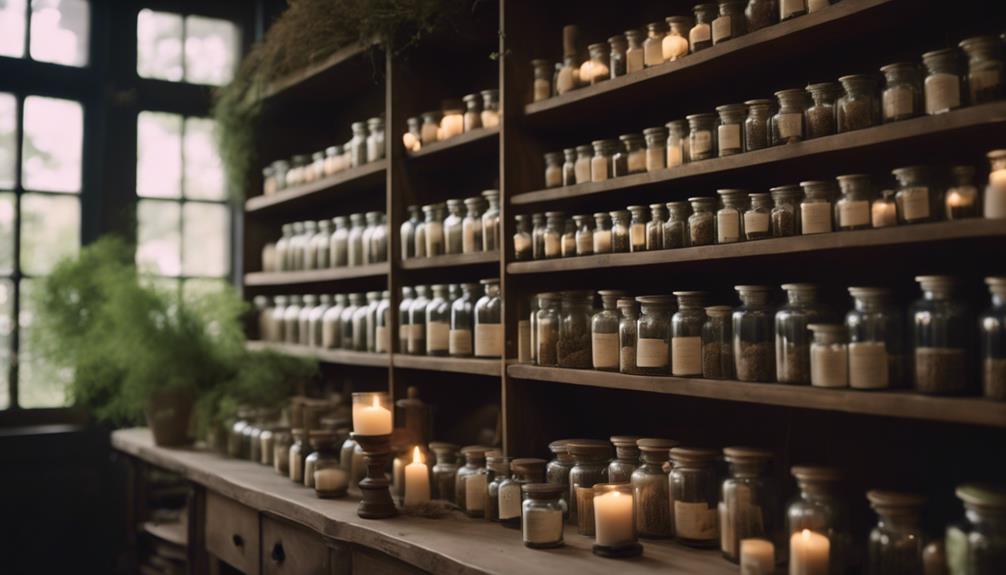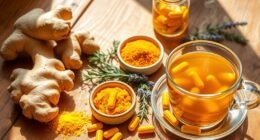We've been using plants for medicinal purposes for thousands of years, and herbalism aims to restore our body's natural healing ability by focusing on holistic health and disease prevention. While it has shown promise, we need to be aware of potential risks and side effects, like interactions with prescription meds and adverse reactions, especially for certain groups like pregnant women and people with allergies. To make informed decisions, we should look for remedies backed by scientific evidence and consult healthcare providers. As we explore the world of herbalism, we'll uncover more about its effectiveness and how it can benefit our well-being.
Key Takeaways
• Herbalism draws on ancient traditions and aims to restore the body's natural healing ability, focusing on holistic health and disease prevention.
• While some herbal remedies show promise, limited evidence supports their effectiveness, and more research is needed to understand their mechanisms.
• Herbal medicines can interact with prescription medications, and adverse reactions are possible, especially in vulnerable populations like pregnant women and those with liver or kidney disease.
• The quality of herbal products and manufacturing processes vary, making it crucial to approach herbalism with a critical eye and consult healthcare providers for guidance.
• Some herbal supplements have low bioavailability, and factors like form, source, and interactions affect their absorption, making it essential to prioritize reputable sources and enhanced techniques.
Understanding Herbal Medicine
As we explore the domain of herbalism, we're attracted to the fundamental question: what exactly is herbal medicine, and how does it work to restore our body's natural balance?
Herbal medicine, also known as herbalism, uses parts of plants for medicinal purposes, drawing on ancient traditions from various cultures worldwide. It aims to restore our body's natural ability to heal itself, focusing on holistic health and prevention of disease. Herbal remedies are commonly used to address a wide range of health conditions, from minor ailments like colds to chronic diseases like cancer.
The effectiveness of herbal medicine is often based on traditional use and anecdotal evidence, with ongoing research exploring their potential benefits and interactions with conventional treatments. As we investigate further, we find that herbal medicine involves extracting chemicals from plants through various methods to create remedies for internal and external use.
With clinical studies underway, we're getting closer to understanding how herbal remedies interact with conventional medicine, offering a more holistic approach to health.
Potential Risks and Side Effects

While herbal remedies can offer promising health benefits, we must also acknowledge the potential risks and side effects that can arise from their use. As with any medication, herbal remedies can interact with prescription medications, reducing their effectiveness or causing unexpected side effects. In addition, the lack of regulation in the herbal medicine industry increases the risk of adverse reactions.
Here are some potential risks to take into account:
- Interactions with prescription medications: Herbal remedies can interact with prescription medications, reducing their effectiveness or causing unexpected side effects.
- Limited evidence: The evidence supporting the effectiveness of herbal medicines is often limited, relying more on traditional use than scientific research.
- Adverse reactions: Bad reactions or side effects can occur after taking herbal medicines, especially if not regulated or properly tested.
- Specific groups at risk: Certain groups, such as those with liver or kidney disease, pregnant women, and individuals preparing for surgery, should be cautious when using herbal medicines.
To minimize potential risks, it's crucial to consult a doctor or pharmacist before using herbal medicines, especially if you belong to specific groups or are taking other medications.
Who Should Avoid Herbal Remedies

As we explore who should avoid herbal remedies, we'll examine specific groups that need to exercise caution.
For instance, pregnant or breastfeeding women should be particularly careful when considering herbal remedies, as some can pose risks to their health or the health of their baby.
Similarly, individuals with allergies need to be aware of potential allergic reactions to certain herbal ingredients.
Pregnant or Breastfeeding
We pregnant and breastfeeding women must exercise extreme caution when considering herbal remedies, as our bodies aren't the only ones affected by their potential risks. Our developing fetuses or nursing babies may also be impacted, making it important to carefully weigh the benefits against the risks.
Here are four key considerations to keep in mind:
- Potential harm to the fetus or baby: Herbal remedies may contain ingredients that can harm the pregnancy or affect breast milk production.
- Uterine contractions and complications: Some herbs can cause uterine contractions, leading to complications during pregnancy or labor.
- Adverse effects and allergic reactions: Herbal remedies can pass through breast milk to the baby, potentially causing adverse effects or allergic reactions.
- Consultation is crucial: Before using any herbal remedies during pregnancy or while breastfeeding, it's vital to consult with a healthcare provider to discuss the potential risks and benefits.
People With Allergies
Prioritizing our health and safety is crucial when considering herbal remedies, as even seemingly harmless substances can trigger severe reactions. We must be mindful of our known allergies and avoid herbal remedies containing those substances.
Allergic reactions to herbal remedies can range from mild skin irritation to severe respiratory distress or anaphylaxis. Common allergens in herbal remedies include chamomile, echinacea, and ragweed, among others.
If we have a history of allergies, especially severe reactions, we should consult an allergist or healthcare provider before trying herbal remedies. Cross-reactivity between pollen allergies and certain herbal remedies may pose a risk to individuals with seasonal allergies.
We should carefully read the labels of herbal products and supplements, looking for potential allergens. By staying informed and cautious, we can minimize the risk of an allergic reaction and make informed decisions about our health.
Herbal Medicine and Surgery

Before going under the knife, it's essential that we inform our doctors about any herbal medicines we're taking to prevent potential interactions with anesthesia and other medications. Herbal medicines can affect blood clotting and blood pressure, making it important to disclose their use before surgery.
Here are some key considerations to keep in mind:
- Herbal medicines and anesthesia: Some herbal medicines can interfere with the effectiveness of anesthesia, which can lead to complications during surgery.
- Blood clotting and blood pressure: Herbal medicines can affect blood clotting and blood pressure, increasing the risk of bleeding or cardiovascular complications during surgery.
- Stopping herbal medicines before surgery: Our healthcare providers may recommend stopping herbal medicines before surgery to minimize risks and ensure a safe surgical outcome.
- Communication is key: Consulting with our healthcare team about herbal medicine usage before surgery is vital for our safety and best surgical outcomes.
Buying Herbal Medicines Safely

When purchasing herbal medicines, it's important that we take steps to guarantee their safety and authenticity. One way to do this is to look for products with a traditional herbal registration (THR) mark on the packaging, which assures quality and safety.
However, buying herbal medicines online or by mail order can be risky, as we may end up with fake or contaminated products. We should avoid herbal slimming or sexual performance products online, as they may contain dangerous or undisclosed ingredients. Unlicensed herbal medicines from abroad can also pose a risk, as they may lack regulation and quality control.
To buy herbal medicines safely, we should seek out reputable sources and be cautious of potentially harmful substances. By taking these precautions, we can minimize the risk of acquiring unsafe products. Remember, when it comes to buying herbal medicines, it's always better to err on the side of caution and prioritize our health and well-being.
The Science Behind Herbalism

Now that we've established the importance of buying herbal medicines safely, we're going to explore the science behind herbalism.
We'll examine how plant compounds interact with each other and our bodies, as well as the complex processes of bioavailability and absorption.
Plant Compound Interactions
As we explore the science behind herbalism, it's clear that plant compounds interact with our bodies in complex ways, setting off a cascade of reactions that can promote healing and wellness. The interactions between plant compounds and our body's systems are at the heart of herbalism's therapeutic properties.
Here are four key aspects of plant compound interactions:
- Synergistic effects: Plant compounds in herbal remedies can have enhanced therapeutic properties when combined, leading to more effective treatments.
- Holistic approach: Herbalism focuses on using whole plants or plant extracts to support the body's natural healing mechanisms, rather than isolating individual compounds.
- Research and mechanisms: Continued research into plant compound interactions helps uncover the mechanisms behind the effectiveness of herbal remedies.
- Therapeutic potential: The interactions between plant compounds and our bodies hold vast therapeutic potential, making herbalism a promising area of study.
Bioavailability and Absorption
We're often led to believe that herbal remedies work wonders, but the reality is that their effectiveness hinges on an essential factor: bioavailability, or the amount of active ingredients our bodies can actually absorb and utilize.
The bioavailability of herbal remedies is critical, as it determines the amount of active ingredients that can be absorbed and utilized by the body. Factors like the form of the herbal preparation, the plant source, and interactions with other substances can affect bioavailability.
Unfortunately, some herbal supplements have low bioavailability due to poor absorption or rapid metabolism in the body. This is where enhanced bioavailability techniques come in – incorporating black pepper extract in turmeric supplements, for instance, can improve the absorption of certain herbal remedies.
Understanding bioavailability is vital for optimizing the effectiveness of herbal treatments and ensuring their therapeutic benefits. By recognizing the importance of bioavailability, we can maximize the absorption of active ingredients and harness the full potential of herbal supplements.
Separating Fact From Fiction

When exploring the world of herbalism, it's crucial to separate the wheat from the chaff, distinguishing between remedies backed by scientific evidence and those relying on anecdotal claims. We need to approach herbalism with a critical eye, recognizing that while some herbal remedies have shown promising results, many lack concrete evidence to support their claims.
Here are some key factors to keep in mind when evaluating herbal remedies:
- Scientific evidence: Look for remedies supported by credible research and studies.
- Quality: Take into account the quality of the herbal product, including the source and manufacturing process.
- Individual response: Be mindful that individual responses to herbal remedies can vary greatly.
- Interactions with medications: Consult healthcare providers to ensure safety and avoid potential interactions with medications.
Frequently Asked Questions
Are Herbalists Legitimate?
We consider the question: are herbalists legitimate?
The answer is yes. Herbalists are trained professionals who undergo education and training in herbal medicine. They're equipped to provide safe and effective treatments, recommending remedies tailored to individual needs and health conditions.
Are Herbs Really Effective?
Imagine a canvas with vibrant brushstrokes, each representing a unique herb. As we examine the artwork, we ask: are these herbs really effective?
The answer is complex. While some herbs show promise in alleviating symptoms, their potency depends on factors like quality, dosage, and preparation. We've seen instances where herbal remedies provide benefits, but individual responses vary greatly.
Consulting healthcare professionals is essential to understanding their potential effectiveness for specific health concerns.
What Is the Most Powerful Herbal Medicine?
We're curious about the most powerful herbal medicine, and it's a great question! The answer isn't straightforward, as the effectiveness of herbal remedies varies widely depending on the herb and condition.
However, some popular options like turmeric, ginseng, and echinacea have shown promising results in specific cases. Consulting a healthcare provider or herbalist can help determine the best herbal medicine for individual needs.
What Does Herbalist Actually Do?
As navigators of the botanical world, we herbalists chart a course to wellness. We assess individual health conditions, recommending tailored remedies that harmonize with each person's unique needs.
By considering traditional wisdom, scientific research, and individual responses, we craft holistic approaches that encompass dietary changes, lifestyle modifications, and herbal treatments.
Our goal is to support the body's natural healing processes, addressing underlying imbalances and fostering equilibrium and vitality.
Conclusion
As we sift through the evidence, it's clear that herbalism is a mixed bag – sometimes it's the solution, sometimes it's the problem. While some remedies show promise, others are nothing more than expensive placebos.
Ultimately, it's up to us to separate fact from fiction and approach herbalism with a healthy dose of skepticism. After all, natural doesn't always mean safe, and a little knowledge can be a dangerous thing.










